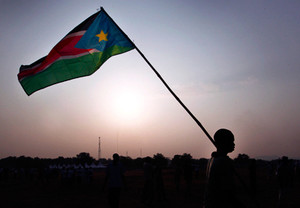Four months after secession from the Republic of the Sudan, the South Sudanese press finds itself in a parlous position in the fledgling African state. Guarantees of press freedom, which came into effect in the Transitional Constitution adopted in April 2011, provide a measure of press freedom in the same article that deals with citizen’s rights to freedom of expression. But such pronouncements are yet to be cemented into law.
The new constitution gives no explicit guarantees of protection to journalists exercising their profession. Article 24 jointly concerns freedom of expression and the freedom of the press and calls for the media in general to be “regulated by law in a democratic society.” It goes on to state that “all media shall abide by professional ethics.”
The lack of a coherent media and information policy was highlighted in a recent Government of South Sudan press release, dated 20 October. It confirmed that although the country’s media bills were nearly finalised, "South Sudan’s proposed media laws are yet to go before parliament." Before the country’s formal secession from the Republic of the Sudan, the ruling Sudan People’s Liberation Army/Movement (SPLA/M), who have ruled the South since a 2005 peace agreement, pledged to enact new laws to govern the press in the country. However, many fear the delay in passing a legal framework has left the industry vulnerable to abuse.
Concern about the situation came to light when Oliver Modi, chairman of the Union of Journalists of Southern Sudan, told the New York-based Committee to Protect Journalists (CPJ) in September that South Sudan had seen at least eight attacks against the press since the start of 2011. In response, the country's Minister of Internal Affairs, General Alison Manani Magaya, recommended that before a legal framework for the press is implemented, the South Sudanese media should engage in “responsible” reporting. “Whatever you write”, he advised, “always … ask yourself 'if this goes out does, it have any implications on me as an individual, the country, or the individual I am writing about?'”
Concerns have been expressed over the administration’s treatment of the media, fuelling worries about the potential for the country to mimick its northern neighbour, the Republic of Sudan, and its policy of media repression. The country has a long history of attacks against the media and is currently reconsidering the 2009 decision to repeal pre-publication censorship.
Furthermore, on 4 September, security forces confiscated issues of Al-Maydan, the bi-weekly paper of the Sudanese Communist Party (SCP), as well as the daily Al-Jarida. A CPJ report in June raised concerns that Sudanese journalists and publications were being "aggressively" targeted by the authorities through "contrived legal proceedings, politicised criminal charges, and confiscations."
Warnings persist from CPJ and British human rights watchdog Article 19 that for some time, “they [the government of South Sudan] have applied the 2004 [north Sudanese] Press Council Act passed by the … parliament in Khartoum.” The organisations suggest that the media in South Sudan is treated as a “lapdog... as a result of which it is not being given the opportunity to develop or hold government representatives to account." CPJ went on to express concern that the military/civilian leadership of South Sudan "may still harbour a war mentality that is unaccustomed to criticism.”
Nhial Bol, editor-in-chief of South Sudan’s leading daily newspaper, The Citizen, is a case in point for those concerned about the treatment of the press. In June, The Citizen printed the story of Mr Bol’s arrest by the South Sudanese security forces who, according to Mr Bol, threatened to beat him after he demanded to know the charges against him. It was eventually revealed that he had been arrested "because you are against our government and your writing has spoiled us.” The offices of Mr Bol's newspaper were subsequently stormed on 30 September, at which point he was again arrested without charge, later to be released.
Similarly, two journalists from the Juba-based Destiny newspaper, Peter Ngor Arol Garang and Dengdit Ayok, were arrested and held without charge for four days at the beginning of November. It is thought the arrests came in connection to an article critical of South Sudanese president Salva Kiir’s decision to allow his daughter to marry an Ethiopian man. Neither journalist, according to Amnesty International, has yet had access to legal council.
There is hope, however, that South Sudan's private media market will be allowed to flourish, with reports of an interest from Kenyan-based Nation Media Group (NMG) in buying a stake in The Citizen. Furthermore, China recently gave the South Sudanese government $31.5m to fund development projects, part of which will go towards a number of new radio stations in the country.
The creation of the state of South Sudan is a momentous opportunity in the region’s modern history that must be made to serve the interests of the people who fought and voted for the cause of secession. Despite the economic and social hurdles that the country now faces, securing the best possible future for the people of South Sudan will in no small part rely on the establishment of an independent press that can freely play its role in maintaining a robust defence of open, accountable government.
Accepted international standards for overseeing the press must be considered when it comes to self-regulation and the writing of new legislation. Equally, violence or physical attacks against journalists must not be allowed to detract from the essential role that the media plays in promoting and enriching democracy in a free society.




